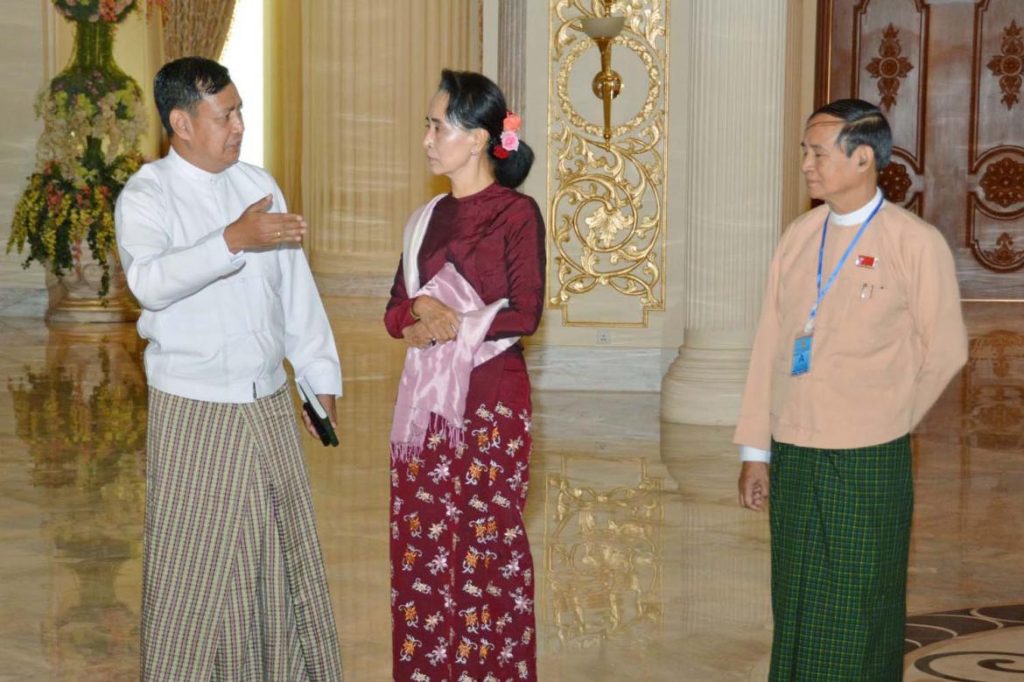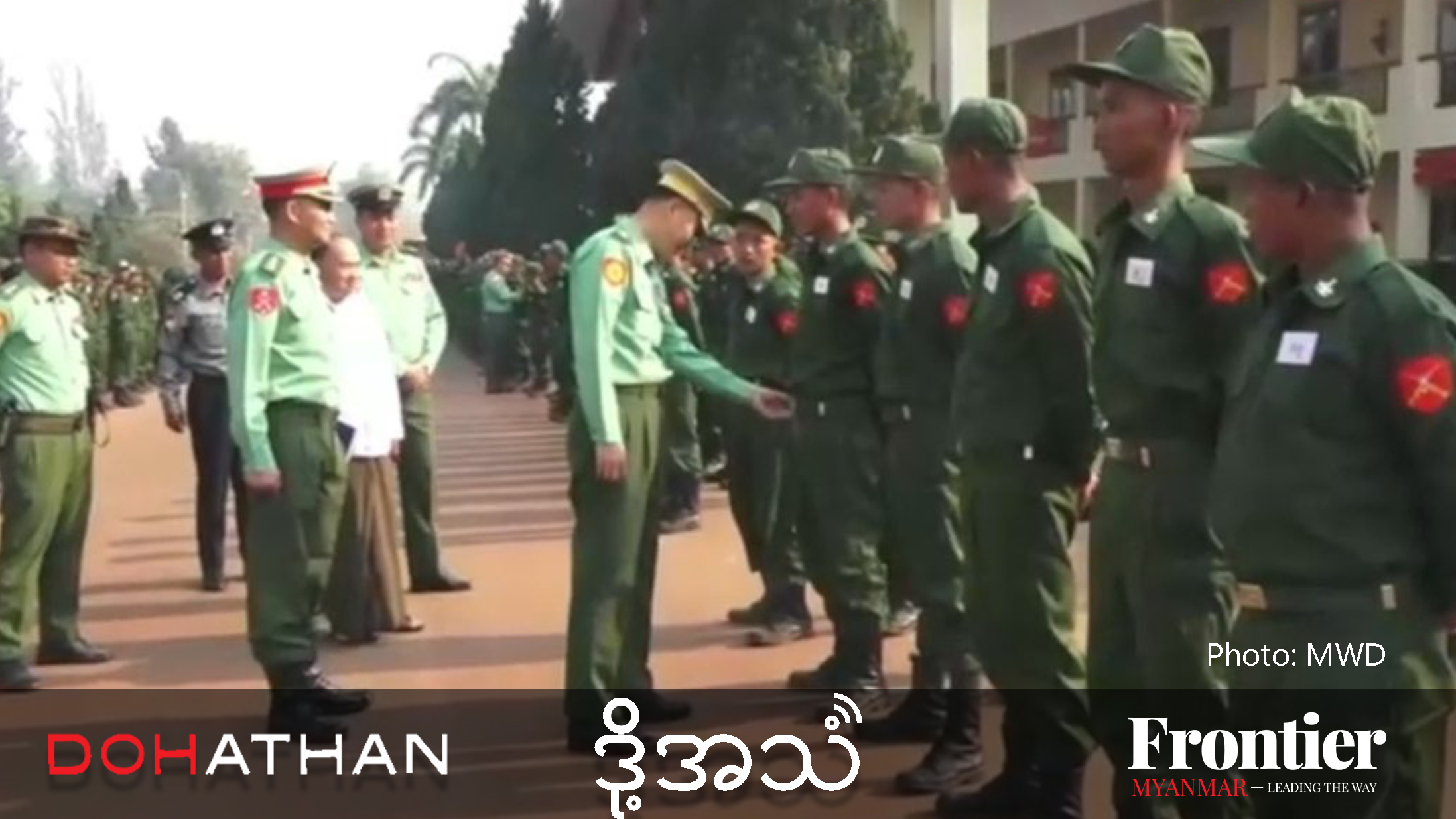U Ye Htut, former minister for information and visiting senior fellow at the ISEAS-Yusof Ishak Institute, talks Rakhine with Frontier’s Thomas Kean.
AS PRESIDENTIAL spokesman and later minister for information in the previous government, U Ye Htut worked closely with President U Thein Sein as his administration grappled with communal tensions in Rakhine State and international pressure to resolve the crisis.
Since leaving office in 2016 Ye Htut has been based at the ISEAS-Yusof Ishak Institute in Singapore, where he is working on a book about the reforms undertaken by Thein Sein.
On the first anniversary of the Arakan Rohingya Salvation Army attacks in northern Rakhine State, he explains why international pressure won’t help State Counsellor Daw Aung San Suu Kyi, how Thein Sein approached the issue differently and why he thinks a tripartite dialogue might break the deadlock in Rakhine State.
What is your assessment of the government’s response to the Rakhine crisis over the past year?
My view is that since August 2017 the government’s actions on the Rakhine issue are just reactive instead of proactive. That’s the major problem. The second problem is a lack of transparency. In particular, they didn’t allow the media to enter the conflict area. The third one is that Aung San Suu Kyi prefers to use the development approach to solve the Rakhine issue.
But actually it’s not about development, it’s about citizenship and the security issue. The fourth is that she neglected the feelings and concerns of the ethnic Rakhine people. That’s my review over the last year.
What’s the single most important step the government could take to address these problems?
Support more independent journalism like this. Sign up to be a Frontier member.
The first thing Aung San Suu Kyi and the National League for Democracy government should do is launch a dialogue with the Rakhine people and the military. They should hold a tripartite meeting at which they have to agree on the principles of a future approach to the Rakhine issue. Without this agreement on the Myanmar side I think nothing can be done, short or long term, to solve the Rakhine problem.
What should the dialogue focus on?
The citizenship for Bengali or Rohingya people. The main issue is whether Myanmar will accept the name of Rohingya as the name of a community or race. Without settling this point I think the government cannot handle the citizenship issue of the refugees.
The second point is how to ensure security – to defend against the terrorist group and also to control the border – and how to guarantee the Rakhine people that illegal migration from Bangladesh has been stopped.
Shouldn’t the Rohingya community be part of that dialogue too?
Before the government offers proposals on citizenship and security to the Rohingya or Bengali community, they must have support from the Rakhine people and military. That’s why they have to start with tripartite dialogue and then negotiate with the Bengali or Rohingya community.
Does that mean that domestic dialogue should be prioritised over international engagement on the Rakhine issue?
Without a consensus among domestic stakeholders, Aung San Suu Kyi cannot offer a workable solution on the Rakhine issue. Without that workable solution, Myanmar will not be able to establish good international relationships.
On the Rakhine issue the relationship with Western countries now is bad, but I think if you look at the whole picture Western countries still need Aung San Suu Kyi for the democratisation process of Myanmar.
We understand Western countries’ concerns about the situation, especially the human rights situation in northern Rakhine, but also Western countries should understand the obstacles Aung San Suu Kyi’s government is facing. She is an elected politician, an elected leader. Western political leaders have to consider the feelings of the majority of people – well, so does she.
I have been following the response from the European Union and United States on northern Rakhine. From what I’ve seen so far, I think their policy will not help Aung San Suu Kyi on this issue. Instead of going public with strong language and warnings, they have to use the quiet diplomacy approach to deal with Aung San Suu Kyi.
Some diplomats and analysts say they think she has received bad advice on the Rakhine issue from some of the people around her. Do you agree with this?
I think this is not about her advisers; it’s about Aung San Suu Kyi’s characteristics and leadership style. Sometimes she’s very stubborn. Sometimes she refuses to listen to different ideas, not only from foreigners but also local people, like the Rakhine and other stakeholders.
Many would argue that the crisis is a legacy of past mismanagement in Rakhine State, including to some extent under President U Thein Sein. How did he handle the Rakhine issue differently than Aung San Suu Kyi?
If you look at how President Thein Sein solved the problem, the major difference between him and Aung San Suu Kyi is that Thein Sein always welcomed and was ready to listen to different ideas. He tried to build consensus and tried to bring all stakeholders into the process, including the Bengali or Rohingya.
He visited the Buthidaung/Maungdaw area many times, he allowed media free access, and even though he sometimes disagreed with international organisations he didn’t stop their operations.
If you look at the Thein Sein era he was able to stop the cycle of [communal] violence after 2013, even if he wasn’t able to resolve the issue overall. I would say he did a better job on this issue than Aung San Suu Kyi.
Another big difference is that Thein Sein understood the situation, the complexity of the issue. Aung San Suu Kyi has never been to that area – even before 2015, she only visited southern Rakhine State and she only went once.
She doesn’t speak to the Rakhine community. The one time she went to northern Rakhine State, when she went to Sittwe she didn’t set foot outside the airport. She held meetings in the airport and flew to Maungdaw and then flew back to Nay Pyi Taw. She didn’t talk to local community leaders.
On the citizenship issue specifically, though, it doesn’t seem like Thein Sein made any progress? The national verification programme resulted in just a handful of Muslims getting citizenship.
We had a citizenship pilot project in Myebon. The main obstacle was the term “Rohingya”. Before 2012 most of the Bengalis were not asking to use the name Rohingya. But after 2012 most of the ordinary Bengalis thought they needed [an ethnic] identity to protect their rights. Now most of the people won’t participate in the NV process unless government recognises the name.
There is no question about ethnic status – we can’t give it to them – but we need to consider whether we can allow them to use the name as a community. That’s the one and only solution, I believe.
Won’t the Tatmadaw block that though?
Their only goal or mission is to control the security, to maintain the security and stability in that area, and protect the rights of ethnic people.
The most important thing for Aung San Suu Kyi is to build the trust with the military. In my personal view, the military sometimes thinks Aung San Suu Kyi tries to use them as a scapegoat on this issue, to weaken their role and damage the military’s image. On the Kokang and Rakhine issues many Myanmar people are seeing the military in a different light. I think ASSK has some concerns on this, or at least her supporters do. I think some people in the NLD inner circle may try to use this [Rakhine] issue to weaken the military.
How do you think the military views the recent formation of the Commission of Enquiry?
She is using this kind of enquiry mission to force the military to agree with her policy [on Rakhine]. That means, she is saying that she is the only one who can protect or stop [prosecution].







